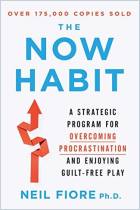Rejoignez getAbstract pour lire le résumé !

Rejoignez getAbstract pour lire le résumé !
James Clear
Procrastination
A Scientific Guide on How to Stop Procrastinating
James Clear, 2016
Aperçu
Procrastination is both a common problem and a major barrier to productivity. But how can you kick the habit?
Recommendation
Procrastination is a common problem, and for sufferers, it can be easy to delay finding a solution. Author James Clear offers a scientific guide to understanding why procrastination occurs. He provides four practical approaches to help you put an immediate end to procrastination and two larger strategies to help ensure that your procrastination habit doesn’t re-emerge. getAbstract recommends that you digest this brief, but helpful article today to help you stop putting off other important tasks until tomorrow.
Summary
About the Author
James Clear writes about behavioral psychology, habit formation and performance improvement.
























Comment on this summary
Hence, I think the focus always should be on our role in solving others' problems. It is not sufficient to tell them that they are 'procrastinators' and how they must change. The only and best way is to find the problem causing the delays and help solve it for/with them. For example, it may be just as easy to connect the person with a less challenging co-worker...